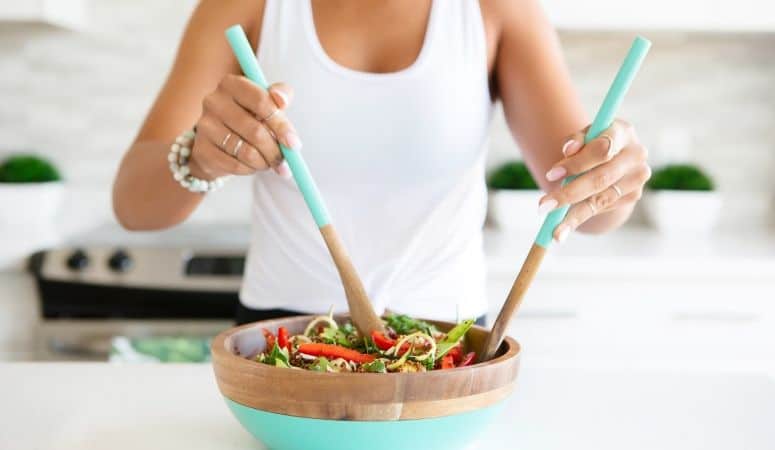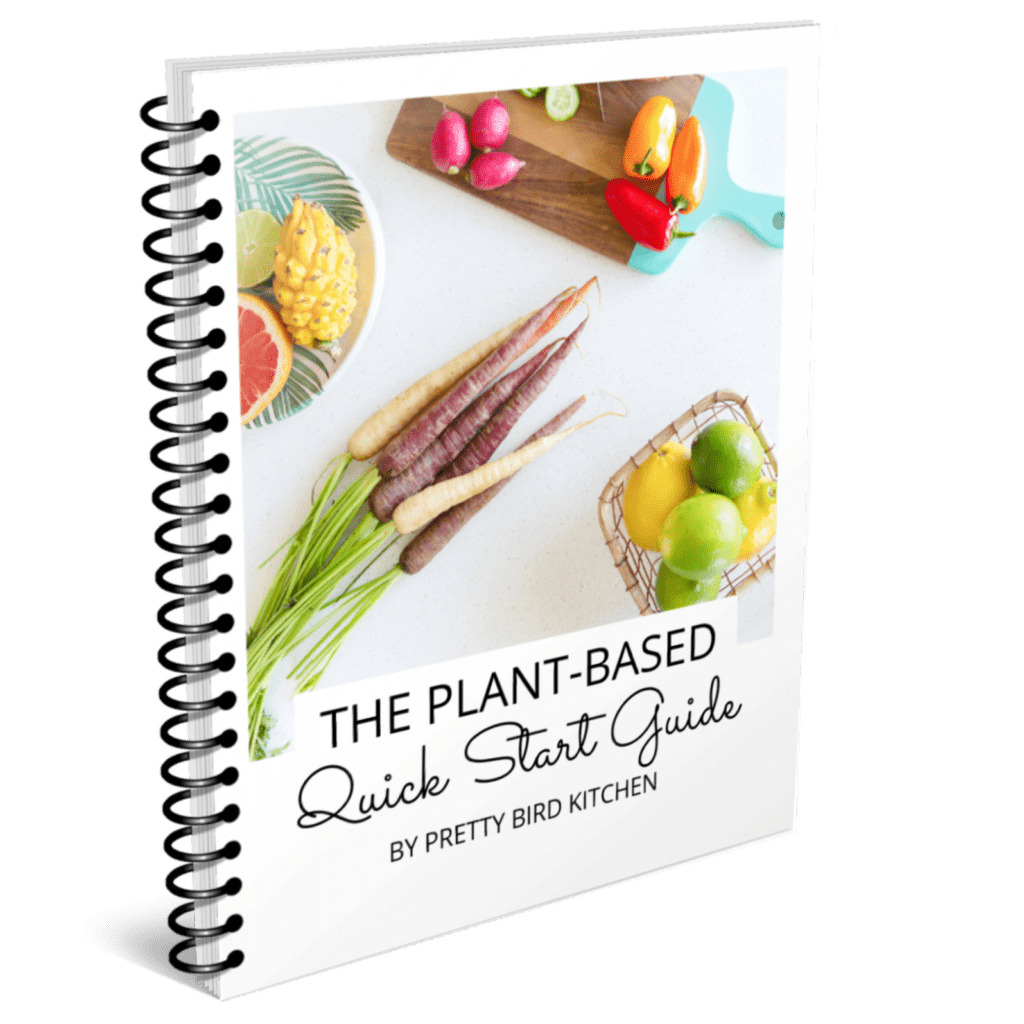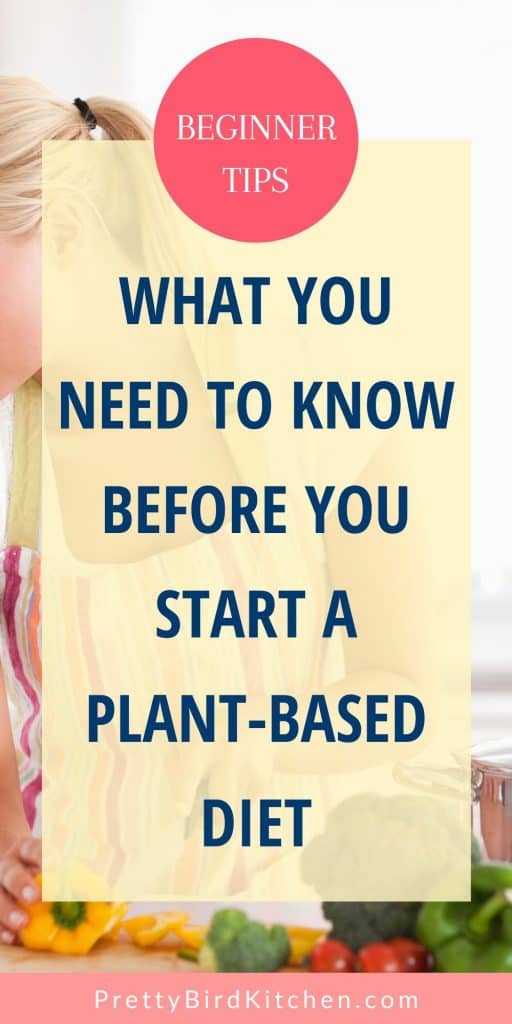How to Start a Plant-based Diet: The Ultimate Transition Guide for Beginners
Here’s how to start a plant-based diet so you can improve your health and live life to the fullest! With these healthy eating tips, you’ll be well on your way to better nutrition and a lifetime of wellness. Keep reading to see my best beginner tips for starting your whole food, plant-based lifestyle.

This post may contain affiliate links. See my full disclosure here.
Disclaimer: I am not a healthcare professional. This is our personal experience, and your experience may be different than ours. You should do your own research before making any changes to your diet or lifestyle especially if you have a health condition.
Wondering how to start a plant-based diet but don’t know where to begin? Then you’re in the right place today, my friend!
My husband, Josh, and I transitioned to a plant-based diet in 2016 after learning that it can heal some pretty serious health problems. Since we both suffered with digestive issues, we were thrilled when this way of eating healed my irritable bowel syndrome and Josh’s “incurable” autoimmune disease.
As you can imagine, I’m always happy to help other people adopt this lifestyle!
If you think a whole food, plant-based diet may be right for you, then you’ll need some guidelines to help you navigate this new terrain.
Let me share with you the tips that worked for us. They’ll start you off on the right track so you can make the most out of this fantastic journey!
But First, What Exactly is a Whole Food, Plant-based Diet?
I can’t tell you how to start a plant-based diet without first explaining what a plant-based diet really is.
At its core, a whole food, plant-based diet consists of fruit, vegetables, whole grains, legumes, nuts, and seeds in their whole or minimally processed forms.
Pretty easy, huh?
This lifestyle encourages eating an abundance of whole plant foods while avoiding animal products (meat, eggs, and dairy) and overly processed foods (bleached flour, enriched flour, white sugar, white rice, and just about all prepackaged foods you’d find in the grocery store).
You don’t have to worry about counting calories or carbs, pairing your food a certain way, or getting more of a certain macronutrient than others. All you have to do is eat plants!
- Related: The Whole Food, Plant-based Diet Explained
- Related: Plant-Based vs. Vegan: The Major Differences You Need to Know About
How to Start a Plant-based Diet
Now that we have the basics out of the way, let’s get to the good stuff! Here’s how to start a plant-based diet the right way.
Read, Read, Read!
The first thing you need to do to start a plant-based diet is read up on the subject.
My all-time favorite resource is The China Study. That book tells you everything you need to know about the science behind a whole food, plant-based diet. It will give you a solid foundation so you understand how and why a whole food, plant-based diet works so well, and it also offers some helpful transition tips to make the journey easier.
You can also check out my detailed beginner’s ebook, Zero to Plant-Based: A Simple Guide for Starting a Whole Food, Plant-Based Diet. In that book, I share everything I wish I had known when I first went plant-based back in 2016.
It covers:
- What to eat and avoid
- Grocery shopping tips
- How to read food labels
- Cooking tips
- How to save money on whole plant foods
- Where to find recipes + my favorite recipes
And so much more!
Plus, it comes with a companion workbook that has worksheet pages to help you implement the action items in the book and printable cheat sheets that you can keep for easy reference.
In a nutshell, Zero to Plant-Based is designed to make the transition as easy as possible with step-by-step instructions and easy-to-understand language.
If you don’t want to buy Zero to Plant-Based, you can still grab my free quick-start guide below. It has a lot of helpful beginner tips!

Get my FREE plant-based quick start guide
If you aren’t sure where to begin with your whole food, plant-based diet, then this step-by-step guide will help.
Determine Your “Why”
A whole food, plant-based diet can do a lot of wondrous things for your health.
According to the information and success stories featured in The China Study and Hallelujah Diet’s 60 Days to Reclaim Your Health video series, a whole food, plant-based diet can prevent, halt, and/or reverse a variety of health conditions such as:
- Heart disease
- Cancer (breast, prostate, bowel, melanoma, and others)
- Diabetes (reverse Type 2; significantly improve Type 1)
- Autoimmune diseases (ulcerative colitis, Hashimoto’s, multiple sclerosis, rheumatoid arthritis, scleroderma, and others)
- Irritable bowel syndrome
- Osteoporosis
- Erectile dysfunction
- High blood pressure
- High cholesterol
- Alzheimer’s
- Kidney stones
- Weight problems
- Depression
- Anxiety
- ADD/ADHD
- Low energy problems
- Sciatica
- Acne
- Migraines
And so much more!
Now that you know what a whole food, plant-based diet can do for your health, really nail down your reasons for wanting to change the way you eat.
Are you starting this new lifestyle so you can
- Reverse or improve a specific health condition?
- Improve your overall long-term health?
- Avoid a disease that’s been running in your family for years?
- Play on the floor with your grandchildren?
- Set a good example for your kids?
Having a compelling “why” will motivate you to stick with this lifestyle change even when times get tough.
Adjust Your Mindset
Whatever you do, don’t adopt an all-or-nothing mindset. There are some people who are able to change their eating habits overnight, but they are the exception, not the rule. If you try to change your eating habits too quickly, you may get burned out and give up altogether.
Instead, remember that this is a journey, and allow yourself a little bit of grace. Try to make the best health decisions the majority of the time, and don’t obsess over the rest. You’ll be much happier and much more likely to stick with this new lifestyle for the long haul when you approach it with a realistic attitude.
Find Some New Recipes
It’s very likely that your current recipe inventory deviates significantly from a whole food, plant-based diet.
Sometimes it can be hard to find new recipes that suit your family’s tastes, but you should use this time to experiment with a variety of new recipes, foods, and flavors. You may even discover some new favorites!
Some of my favorite plant-based recipe resources are The Garden Grazer, Oh She Glows, and Hallelujah Diet. Some of the recipes from these sources aren’t 100% whole food, plant-based, but they’re awfully close.
You can also search for plant-based recipes on Google or Pinterest. Just remember to choose recipes that emphasize an abundance of plant foods in their whole or minimally processed forms.
Related: 15 Plant-based Recipes You Need to Try
Get Picky at the Grocery Store
When you’re shopping at the grocery store, be very selective of the packaged and premade foods you buy. Don’t buy anything without reading the ingredient list first.
Choose foods that
- Have a short ingredient list
- Contain real ingredients that you can pronounce
- Contain whole plant ingredients
Avoid and/or minimize foods that
- Have a long ingredient list
- Contain unnatural ingredients that you can’t pronounce or that you don’t know what they are
- Contain animal products (meat, dairy, eggs, lard) and/or refined ingredients (enriched flour, bleached flour, sugar, canola oil, etc.)
Related: Plant-based Shopping List: What to Buy When You Follow a Plant-based Diet
Plan Ahead When Eating Out
Eating out at restaurants can be a bit troublesome when you follow a plant-based diet. However, with a bit of planning, you’ll be able to stick to your new eating plan like a pro!
When eating out, choose restaurants that offer plenty of plant options. If you need something quick, try to find a Subway or other sandwich shop. You can typically customize your order to include lots of plants and exclude foods such as meat, cheese, and dairy-laden condiments.
If you find yourself at a dine-in restaurant, order from the “sides” section of the menu. Often, you’ll have plenty of vegetable options to choose from, and you may even see a wild rice option, depending on the restaurant.
If you’re visiting an up-and-coming area, a quick Google search may reveal some hidden vegan restaurants that you could visit, too.
Of course, when you dine out, you can’t control the ingredients that the cooks use to prepare your food. Those collard greens may have been cooked in a pot with a ham bone, and those green beans may have a bit of butter in them.
The truth is that you cannot be 100% certain that your food is 100% whole food, plant-based. And that’s okay.
Restaurants should be the exception rather than the rule, so make good food decisions when you cook at home and allow yourself a little bit of grace when you eat out.
Plan Ahead When Traveling
Traveling can also be a bit tricky. When you travel, you should keep in mind the restaurant tips I mentioned in the previous section.
Also, you can plan ahead and pack your own food! Travel-friendly, picnic-style foods are great to bring along in the car.
In fact, Josh and I usually pack our own food when we take day trips. Our go-to meal is Bistro Not-Tuna Salad from Hallelujah Diet on Triscuit crackers. We also bring carrot sticks, hummus, pickles, and fruit to round out our plant-based travel menu.
Other Tips to Help You Go Plant-based
- Don’t let money deter you. We actually find that eating plant-based is a whole lot cheaper than eating a normal diet! That’s because animal products and premade foods are way more expensive than plant foods.
- Discount grocery stores such as Aldi and Lidl are your best friend. It’s much more affordable to eat whole plant foods when you buy them from discount grocery stores.
- Get your family involved with everything from learning about a whole food, plant-based diet to choosing new recipes to cooking plant-based meals. They’re much more likely to get on board when they feel included.
- Cook most of your meals yourself. You can control the ingredients AND save money when you cook at home.
- Take one 5000 mcg sublingual (dissolves under the tongue) vitamin B12 supplement once per week to make sure you get this important brain vitamin.
- Take one 5000 IU vitamin D3 supplement every day if you don’t spend enough time in the sunshine to get this vitamin the old-fashioned way. (and if you’re like most Americans, you probably don’t get enough sunshine.)
Related: How to Afford a Plant-Based Diet on a Budget
Related: 3 Supplements You Need When You Follow a Plant-based Diet
Final Thoughts on How to Start a Plant-Based Diet
So now you know how to start a plant-based diet! All you have to do is read up on the subject, determine your “why,” adjust your mindset, find new recipes, get picky at the grocery store, and plan ahead when eating out or traveling!
See? It really isn’t that hard to start a whole food, plant-based diet. And truthfully, the health benefits are well worth the effort.
Before you do anything else, be sure to check out those two books I mentioned earlier, The China Study and Zero to Plant-Based. Those are excellent resources that you can refer back to over and over again as you progress through your plant-based journey.
Other Healthy Living Articles You May Enjoy
- 15 Must-Have Kitchen Items Every Plant-Based Kitchen Needs
- How to Afford a Healthy Lifestyle on a Budget
- 12 Healthy Habits You Can Start Today
- 3 Simple Ways to Live a Healthy Lifestyle
- 26 Affordable Plant-Based Foods to Buy at ALDI
What about you? Are you thinking about starting a whole food, plant-based diet?

Also, if you found this post helpful, feel free to share it or pin it for later!






I love the plant based recipes. I’m still changing my old habit to really feeling better. I’m a vegan person don’t eat to much meat .
I love trying new plant-based recipes! It can be hard changing those old habits, but I can definitely tell that I feel better when I eat whole plant foods. Good luck changing your eating habits too! 🙂
Hi Summer, I’m about to start this journey to a better lifestyle for myself for several reasons. For me this will be a transition and I appreciate you supporting that route. I’ve noticed that there are some pasta and specific bread choices. Are there also specific pasta choices? My husband is a meat lover and will not be joining me on the journey. What advice do you have for a person who is going to make this plant based transition but will be cooking for someone who will not be on a plant based diet?
Hi, Paula! I’m so excited that you’re starting this plant-based journey!!
For pasta, I like to find either 100% whole wheat pasta or gluten free pasta. If I’m going with 100% whole wheat, I just look at the ingredient list and make sure it only lists whole grain durum wheat flour. Walmart and Aldi both carry 100% whole wheat pasta, so it isn’t hard to find those.
Now, gluten free pasta can be a bit tricky. You really have to read the ingredient list to make sure it contains whole plant foods since gluten free pastas sometimes contain weird ingredients. I try to find gluten free pastas made out of quinoa and/or brown rice. Aldi usually has some good options to choose from, and they’re better than other gluten free pastas I’ve tried before. Also, the Pasta Lensi brand has some good pastas made from legumes.
To make cooking easier on yourself, I recommend making dishes that can go either way. For example, if you make spaghetti, leave the sauce and meat separate so you can have a whole food, plant-based meal while your husband has the option of adding meat to his plate. Tacos are another easy meal that can go both ways. Just include plant-based toppings for you and traditional toppings for him.
Also, make some new plant-based recipes and ask him to at least try a couple of bites. He may find that he actually likes them! Plant-based dishes can be incredibly flavorful, and I find that lots of non-plant-based eaters end up liking them after they try them, especially when there’s no pressure to adopt this way of eating. If you can find some plant-based dishes that he likes, then eventually you may be able to reduce the number of days you have to cook meat each week.
Good luck with your plant-based journey! 🙂
Thank you for this! I am transitioning into this due to some medical issues. Cancer twice in my life and I’m only 34. The lasting impact of chemo has taken a toll on my body so my dr have recommended to switch to a plant based to help with the recent diagnosis with cirrhosis. So I am researching but I appreciate your openness about it and it makes me less nervous to start!
Jennifer, I’m so sorry for all the health problems you’ve been through! That’s a lot for anyone to deal with, but I can’t imagine how hard it’s been with you being so young. I truly hope the plant-based lifestyle is the solution you’ve been looking for! And I’m so happy that you have a doctor who supports this lifestyle. If you can overcome cancer twice, then I KNOW you can do this. 🙂